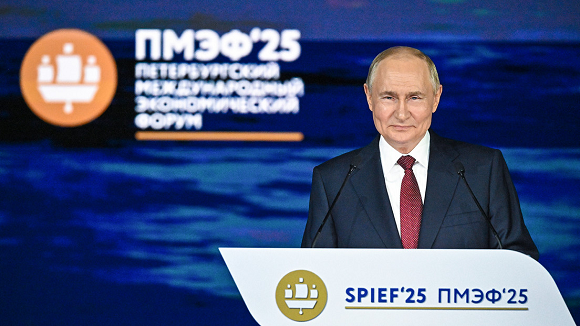
Russia, June 21st. - The President of Russia, Vladimir Putin, spoke this day at the plenary session of the 28th International Economic Forum in St. Petersburg, which is held this year from 18 to 21 June.
Other speakers at the event include Indonesia's president, Prabowo Subianto.
At the beginning of his speech, Putin welcomed all participants and guests to the 28th St. Petersburg International Economic Forum, whose traditional "traditional format" involves substantive and meaningful discussions on the most urgent issues. "We are pleased that representatives from 140 countries and territories have joined the forum talks," he said.
Hydrocarbons no longer determine Russian economic dynamics
Speaking about the current state of the economy, the president stressed that, despite the difficult external context, Russia's GDP has increased by more than 4 per cent annually over the past two years. "In other words, it's growth at a rate above the global average," he said.
"Russia already ranks fourth globally in terms of GDP and the first in Europe," he said.
Putin stressed that "it is certainly not enough to reach this position: it is important to constantly confirm the status of one of the largest economies," creating conditions for domestic and friendly companies to invest resources, modernize and expand production "specifically in Russia."
In terms of GDP without the influence of the industries associated with the production of hydrocarbons, oil and gas, its growth reached 7.2 per cent in 2023 and 4.9 per cent in 2024. "The contribution of the raw materials component no longer determines Russia's economic dynamics," and at some point even had a negative trend, the head of state emphasized.
In addition, the government has achieved "the record reduction in the level of poverty in the Russian Federation throughout the country's history," he said.
Large-scale transformation of the global economy
The global economy is undergoing the biggest transformation of the past 10 years, as several countries in the world community increase their potential and transform both the balance of power and the global economic landscape, Putin noted.
"If at the beginning of the twenty-first century the BRICS countries, for example, accounted for one fifth of the global economy, today they already account for 40 per cent of it. And it is clear that this proportion will continue to grow," he said.
The president said that this "will inevitably happen," especially because of the dynamism of the states of the Global South.
"This growth needs to be more sustainable in order to cover as many countries as possible. This requires a fundamentally new development model, not based on the rules of neocolonialism, when the so-called 'billion-dollar gold' extract resources from other states for the benefit of a small circle: the so-called elites," while these super-profits do not reach ordinary citizens, he explained.
In this context, the Russian president has invited his partners to "contribute to the formation of a new model of global growth." Putin also pointed out that, in this regard, Russia pays "special attention" to strengthening ties within BRICS and specified that the group's mutual commercial volume has already exceeded $1 trillion and continues to grow.
Building a multipolar world
President Putin stressed that Russia aims to join the efforts of all its partners to solve the problems of global civilization and to make these decisions timely, effective and beneficial to all participants in the process.
"First of all, we strive to ensure that the development of the world is balanced, that this development satisfies the interests of as many countries as possible and that a multipolar world order is formed in which participants from the international community can reach agreement with each other," he explained.
With this, he did not rule out participation in these new processes of "those countries that, in one way or another, inevitably lose part of their position in the world economy."
"We also want to, we are ready to reach an agreement with them on everything, if they so wish. But if they want to maintain their monopoly position at all costs, if they want to preserve the instruments of colonial influence in the world, then they will have to act with these instruments and content themselves only with the situation in which they are gradually sliding," he said.
In addition, Putin stressed that Russia and China are not forming a new world order, but are only formalizing it.
"The new world order is emerging naturally. It appears as the sunrise. There is no escape," he said.
Moscow and Beijing are also trying to pave the way for the process of creating the new multipolar order "to be more balanced and satisfying the interests of the vast majority of countries," he added.
Ongoing conflicts
Commenting on Israel's recent statements about the possible assassination of Iran's supreme leader, Ali Jameneí, the president said that Russia "has always advocated ensuring the security of each country without compromising the security of another."
He also rejected the comparison between the Ukrainian conflict with the current escalation between Israel and Iran, when asked if he wants an unconditional surrender by Vladimir Zelenski, as had been demanded by US President Donald Trump to the Islamic Republic.
"First of all, this situation is not similar, but fundamentally different. And secondly, we are not looking for the capitulation of Ukraine. We insist on the recognition of the realities that have developed on the ground," he explained.